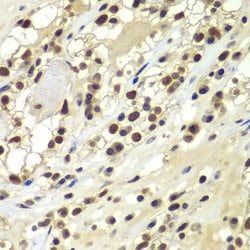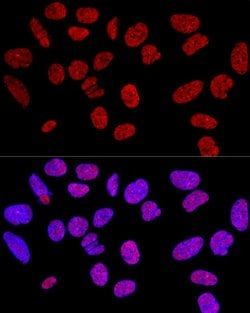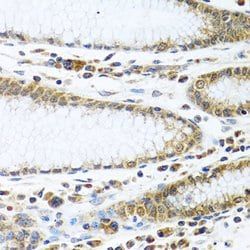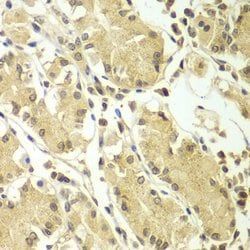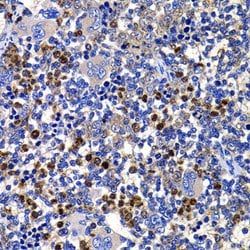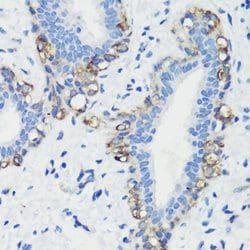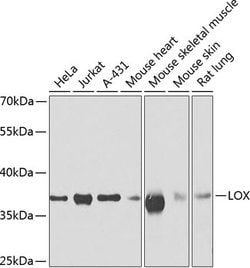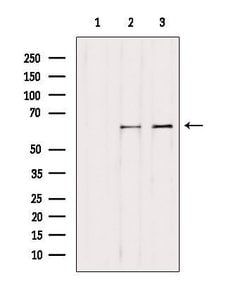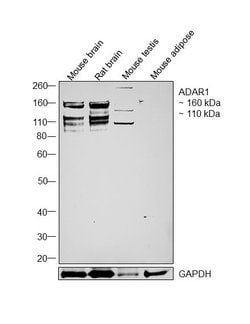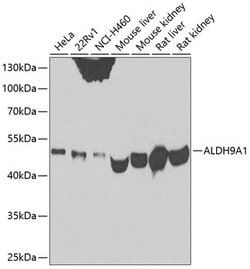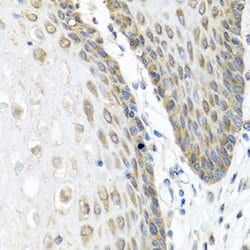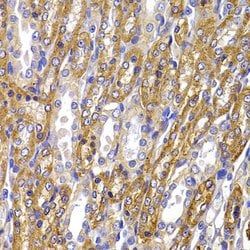ADAR Polyclonal Antibody, Invitrogen™
Manufacturer: Thermo Scientific
Select a Size
| Pack Size | SKU | Availability | Price |
|---|---|---|---|
| Each of 1 | PIPA596839-Each-of-1 | In Stock | ₹ 46,057.50 |
PIPA596839 - Each of 1
In Stock
Quantity
1
Base Price: ₹ 46,057.50
GST (18%): ₹ 8,290.35
Total Price: ₹ 54,347.85
Antigen
ADAR
Classification
Polyclonal
Conjugate
Unconjugated
Gene
Adar
Gene Alias
136 kDa double-stranded RNA-binding protein, ADA, Adar, ADAR1, Adar1p110, Adar1p150, Adenosine Deaminase, adenosine deaminase acting on RNA 1-A, adenosine deaminase RNA specific, adenosine deaminase, RNA specific, adenosine deaminase, RNA-specific, AGS6, AV242451, double-stranded RNA-specific adenosine deaminase, DRADA, DSH, DSRAD, dsRNA adenosine deaminase, dsRNA adeonosine deaminase, G1P1, IFI4, IFI-4, interferon-induced protein 4, interferon-inducible protein 4, K88DSRBP, LOW QUALITY PROTEIN: double-stranded RNA-specific adenosine deaminase, mZaADAR, P136, RNA adenosine deaminase 1, RNA-specific adenosine deaminase p110 form, RNA-specific adenosine deaminase p150 form
Host Species
Rabbit
Purification Method
Affinity Chromatography
Regulatory Status
RUO
Gene ID (Entrez)
103, 56417, 81635
Content And Storage
-20° C, Avoid Freeze/Thaw Cycles
Form
Liquid
Applications
Immunocytochemistry, Immunohistochemistry (Paraffin), Western Blot
Concentration
0.46 mg/mL
Formulation
PBS with 50% glycerol and 0.02% sodium azide, pH 7.3
Gene Accession No.
P55265, P55266, Q99MU3
Gene Symbols
Adar
Immunogen
A synthetic peptide corresponding to a sequence within amino acids 200-299 of human ADAR11 (NP_0011022)
Quantity
100 μL
Primary or Secondary
Primary
Target Species
Human, Mouse, Rat
Product Type
Antibody
Isotype
IgG
Description
- Positive Samples: U-87MG, A549, DU145, HeLa, HepG2; Cellular Location: Cytoplasm, Nucleus, Nucleus, nucleolus Immunogen sequence: RPDGHSQGAP NSDPSLE Adenosine Deaminase RNA Specific (ADAR) catalyzes the hydrolytic deamination of adenosine to inosine in double-stranded RNA (dsRNA) referred to as A-to-I RNA editing.This may affect gene expression and function in a number of ways that include mRNA translation by changing codons and hence the amino acid sequence of proteins; pre-mRNA splicing by altering splice site recognition sequences; RNA stability by changing sequences involved in nuclease recognition; genetic stability in the case of RNA virus genomes by changing sequences during viral RNA replication; and RNA structure-dependent activities such as microRNA production or targeting or protein-RNA interactions
- ADAR can edit both viral and cellular RNAs and can edit RNAs at multiple sites (hyper-editing) or at specific sites (site-specific editing)
- Its cellular RNA substrates include: bladder cancer-associated protein (BLCAP), neurotransmitter receptors for glutamate (GRIA2) and serotonin (HTR2C) and GABA receptor (GABRA3)
- Site-specific RNA editing of transcripts encoding these proteins results in amino acid substitutions which consequently alters their functional activities
- Exhibits low-level editing at the GRIA2 Q/R site, but edits efficiently at the R/G site and HOTSPOT1
- Its viral RNA substrates include: hepatitis C virus (HCV), vesicular stomatitis virus (VSV), measles virus (MV), hepatitis delta virus (HDV), and human immunodeficiency virus type 1 (HIV-1)
- Exhibits either a proviral (HDV, MV, VSV and HIV-1) or an antiviral effect (HCV) and this can be editing-dependent (HDV and HCV), editing-independent (VSV and MV) or both (HIV-1)
- Impairs HCV replication via RNA editing at multiple sites
- Enhances the replication of MV, VSV and HIV-1 through an editing-independent mechanism via suppression of EIF2AK2/PKR activation and function
- Stimulates both the release and infectivity of HIV-1 viral particles by an editing-dependent mechanism where it associates with viral RNAs and edits adenosines in the 5'UTR and the Rev and Tat coding sequence
- Can enhance viral replication of HDV via A-to-I editing at a site designated as amber/W, thereby changing an UAG amber stop codon to an UIG tryptophan (W) codon that permits synthesis of the large delta antigen (L-HDAg) which has a key role in the assembly of viral particles
- However, high levels of ADAR1 inhibit HDV replication
- (Uniprot)
